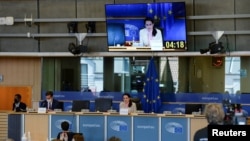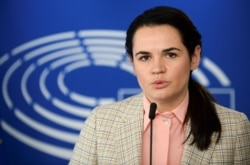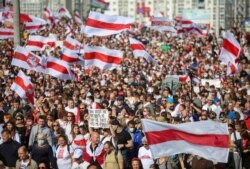Foreign ministers of European Union member countries met with Belarus opposition leader Sviatlana Tsikhanouskaya in Brussels Monday, as they are discussing imposing sanctions on several Belarus officials, possibly including President Alexander Lukashenko.
Tikhanovskaya urged the EU to “be more brave” in taking action to support the opposition’s battle against Lukashenko’s authoritarian regime.
Speaking to reporters after the breakfast meeting with Tsikhanouskaya., EU foreign policy chief Josep Borrell said "she gave us an account of the events in Belarus" and “we are really impressed by the courage and perseverance of the Belarusian people, especially Belarusian women who show a real sense of leadership.”
Borrell said Brussels does not recognize Lukashenko as the legitimate president of Belarus.
“Let me stress that we will support inclusive national dialogue and the rights of Belarusian people for free and fair elections, and this cannot be regarded as an interference in internal affairs because democracy and human rights are at the core of the identity of the European Union," he said.
German Foreign Minister Heiko Maas, whose country holds the EU’s rotating presidency, said “the violence that Lukashenko is exerting against peaceful demonstrators is completely unacceptable.”
" So we will have to discuss today the question of whether it shouldn't be just those who participated in election rigging and those who participated in abuse on the spot [who] face European Union sanctions," he said. "We must also ask ourselves the question of whether Mr. Lukashenko, the one who bears the main responsibility, mustn't also be sanctioned by the European Union."
Demonstrations against Lukashenko have continued almost uninterrupted since he was declared the winner of the disputed August 9 election. Lukashenko has used force and detentions in an effort to end them.












